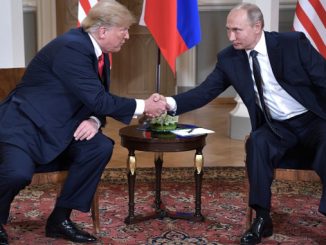
While President Trump’s “strategy of tension,” as described by French President Emmanuel Macron, appears to be effective with North Korea, though calling it a strategy at all, says Phil Giraldi, is questionable given the administration dysfunction. On other fronts, including Iran, Syria and Afghanistan, Trump is failing miserably on his foreign policy scorecard.
By Philip Giraldi
As Donald Trump is currently embarking on a 90-day agenda that has major foreign policy implications for the Koreas and Iran in particular, it is perhaps a good time to reflect on what has been accomplished, or otherwise, in his first 15 months in office.
French President Emmanuel Macron, having recently completed a state visit to Washington, reportedly has described the Trump program as “a strategy of tension,” which seeks to make adversaries uncertain of what the next step by the United States will be in an effort to obtain concessions that might not otherwise be likely.
It might be argued that the “strategy of tension” has worked with regard to North Korea, which might be considering détente with Seoul as an alternative to an attack by the United States. And Trump might even be right when he declares that previous U.S. presidents failed in their duty to strike a deal with Pyongyang. North Korea has long sought an end to the Korean War, which is still in armistice status, but its “unacceptable” condition has been that it should include a pledge of non-aggression from Washington, which successive administrations have refused to agree to lest their hands be tied if the North were to again become aggressive. And it would be conditional on the U.S. withdrawing its forces from the peninsula, knowing that once they are gone they will never return, so some might regard the North Korean overtures as little more than a trick to force the United States to depart before resuming business as usual by the hardline communist state.
Even giving Trump credit for positive developments in Korea, however, it is far from clear that it was part of some kind of strategy, as the White House team has been largely dysfunctional while the president’s grasp of the niceties of international interrelations appears to be minimal.
Iran is another clear case where “tension” is being applied to compel the Iranians to give up their ballistic missile developments to supplement their participation in the Joint Comprehensive Plan of Action to downgrade their nuclear energy program. The decision on whether the United States will withdraw from the agreement will likely be made in the next 10 days [this article was originally published in last week’s AFP Issue 19 & 20, before Trump’s decision on Iran was announced–Ed.], and the signs coming out of White House meetings with German Chancellor Angela Merkel and Macron are unfavorable regarding continued U.S. participation. Iran will likely dig in its heels, and there is a real possibility that it will consider a nuclear weapons program plus a functional delivery system to defend itself against the U.S. and nuclear armed Israel. There will be no coercion of Iran, which will actually fight hard using all its resources to resist an American effort at regime change.
And then there are Afghanistan and Syria. Afghanistan consists of doubling down on the mistakes made in that country since 2001, in the unfortunate belief that they can be corrected. Afghanistan will require some kind of settlement with the Taliban, which currently de facto controls more than half of the country, and which will have to become a partner in government like it or not. As the country is not a vital interest to the United States, extrication of U.S. forces after arranging for some kind of governing formula is the appropriate solution. Taking whatever steps are necessary to escape from a quagmire is acceptable.
Syria is Trump’s reversion to the same bad policies that resulted in Iraq, leading to the creation of ISIS among other consequences, not to mention a cost estimated to be $5 trillion. Syria, like Iraq, is a neocon exercise in delusion. Israel wanted Iraq to become a weakened state divided into ethnic and religious groups, a situation that still prevails in a country that is Shi’a dominated yet contains powerful Sunni and Kurdish regions that challenge the reinstatement of a national identity. Israel also wants the same for Syria, and the United States is complying by trying to create separate security zones that will not only include a large part of the country to the east along the Euphrates River and also to the north, but will also incorporate Syria’s oil production region, sharply diminishing the central government’s income. The formula will not work even though Israel and many in Washington are pushing hard for it.

The fundamental problem is that the United States under Trump persists in believing, as did the former Clinton Secretary of State Madeleine Albright, that the U.S. is the “essential nation” that is able to “see far” and provide leadership for the rest of the world. This kind of thinking is bollocks, as the British are accustomed to saying. The United States foreign policy is driven by special interests, the most prominent of which is Israel and its supporters, in its attempt to remake the Middle East. Can anyone doubt at this point that the world, as well as the United States itself, would be far better off now if it had not invaded in Afghanistan and decided to stay there to fix it, if the U.S. had not invaded Iraq in 2003, and if the Bush and Obama administrations had not been driven by hubris to continue the process in Syria, a drama without any end in sight?
So on balance, Trump might actually deserve an “A” on North Korea, if it turns out that his form of intervention actually brought about some kind of resolution to a problem that has been festering for 65 years. But he deserves a “D” on Afghanistan, which is a classic case of democracy-building gone crazy and an “F” for both Syria and Iran, which are reflective of Israeli desires rather than actual American interests.
There is still time to fix what is going wrong, but it depends on an understanding of what “America first” should actually mean, which is that the demands of hegemonistic foreign clients should no longer guide U.S. policy. Israel should be told that if it wants to attack Iran it should go right ahead, but it should not expect the United States of America to be joining in the effort.
Philip Giraldi is a former CIA counter-terrorism specialist and military intelligence officer and a columnist and television commentator. He is also the executive director of the Council for the National Interest. Other articles by Giraldi can be found on the website of the Unz Review.




